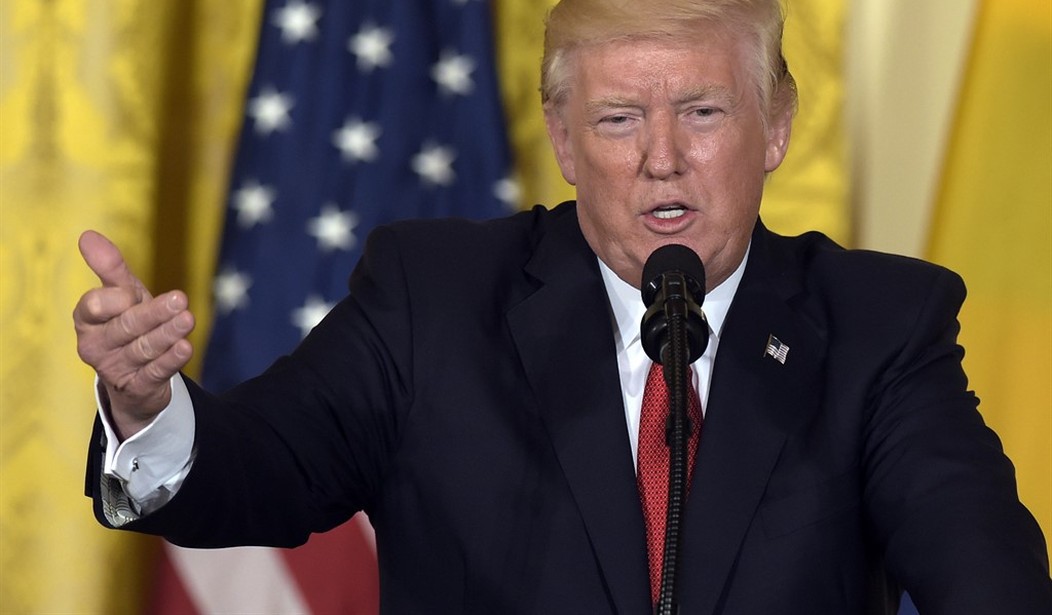An easy call, really, given the direction the administration seems headed. The accord does next to nothing in terms of binding the signatories to take action on limiting emissions. The chief legal obligation is contributing to a $100 billion green fund for developing nations. Obama didn’t bother sending the accord to the Senate for ratification either, knowing what its fate would be under Mitch McConnell, so Trump can do with it what he wants. In every meaningful way, the document is merely hortatory.
As such, the significance of pulling out is mostly symbolic. After a week spent politely flipping off Europe in general and Germany in particular, Trump’s making a sharp break from the international order here. Global warming is the issue that most of the rest of the world agrees on, including his daughter and son-in-law; as Axios notes, the only two countries that aren’t part of the Paris deal are Nicaragua and Syria. If you wanted to broadcast that your presidency will be nationalist, not “globalist,” this is a dramatic yet relatively low-cost way to do it.
It may be now or never, notes Rich Lowry:
Once upon a time, Paris was portrayed as a tool for steadily tightening restrictions on fossil fuels. The Obama team referred to one provision in the accord as “ratcheting up ambition over time.”
Whatever their opportunistic salesmanship at the moment, this clearly is still the goal of the treaty’s supporters and a reason why Trump should get out while the getting is good. International agreements acquire a dead-weight momentum of their own. Witness how hard it is to pull out of the Paris accord now, when it went into effect only last November. In another couple of years, it will acquire the sanctity of the Peace of Westphalia.
The treaty may be notionally voluntary, but climate-change activists will surely hunt for a judge willing to find a reason that the U.S. emission target in the accord is binding. Trump’s unhappy experience in the courts with his travel ban should make him highly sensitive to this judicial threat.
It was four days ago that Trump advisor and Kushner ally Gary Cohn declared in Europe that Trump’s views on climate change were “evolving” as he met with foreign leaders, that he was now “much more knowledgeable” on the subject and had “learned how important it is for the United States to show leadership.” Four days later, Trump’s reportedly ready to flush the accord. That’s a big win for the Bannonites over the Kushnerites and fodder for the rumors that Kushner has lost influence in the inner circle as his Russia troubles have grown. Although it’s also part of a mystery: If Trump is headed in a nationalist direction, why is Cohn reportedly one of two top contenders to replace Reince Priebus as chief of staff? That’s going to create a lot of friction with Bannon. Maybe Trump has decided he wants strong nationalist and “globalist” voices competing to persuade him. Or maybe he’s just winging it without much thought for whether his top aides collectively are ideologically coherent.
Key question now: What does withdrawal from the Paris agreement actually look like? It’s not as simple as it seems. Per Axios, Trump has two options. One: He could follow the withdrawal mechanism under the agreement itself, but that’ll take until 2020 to complete. The accord says no party may begin the process of exiting until 2019 at the earliest, and even then the exit process will take a full year. That means this will land in Trump’s lap in 2020, right before the election. Then again, how many voters give a wet fart about climate change treaties? Two: He could pull out of the United Nations Framework Convention on Climate Change, the treaty that underlies the Paris accord. Going that route would be faster but it would also mean that the U.S. is effectively withdrawing from all sorts of global warming diplomacy, not just Paris. That would be … bold. A related question is whether he’ll just announce that the U.S. is done with the accord or whether he’ll do what Obama refused to do and punt the agreement to the Senate for ratification, knowing that McConnell’s caucus is destined to kill it. Once they do, Trump can shrug and say, “The Senate has spoken,” and then begin the withdrawal process via one of the two options I mentioned. Republican senators won’t like that — why force them to take a kinda sorta tough vote when they don’t have to? — but Trump might want some cover from his party on this. I doubt it, though: Nothing says “strength” and “leadership” like claiming unilateral power to decide the fate of the accord. Why look weak by asking McConnell to be a fig leaf for your decision?
I think he’ll choose door number one and withdraw from the agreement itself, not the underlying Convention on Climate Change. That way he’ll have two years to change his mind and dangle U.S. reentry into the agreement as leverage in his dealings with the EU. It’ll also somewhat appease the Jared wing of the White House, which would be even grumpier than it is now if he tore up the Convention and effectively nuked U.S. climate-change diplomacy.
Update: Are Axios’s sources trying to force Trump’s hand by whispering that he’s made a decision when he hasn’t really?
Headlines are outpacing POTUS (once again). I'm told Trump hasn’t made a final decision on Paris as of this AM & has climate meetings today.
— Philip Rucker (@PhilipRucker) May 31, 2017







Join the conversation as a VIP Member